lesson19A story or a pome导学案
Lesson19 A Story or a Poem 教案-最新教育文档
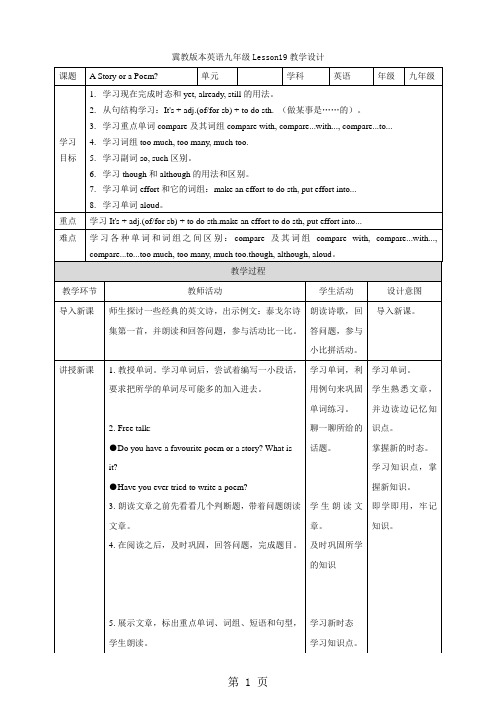
3.朗读文章之前先看看几个判断题,带着问题朗读文章。
4.在阅读之后,及时巩固,回答问题,完成题目。
5.展示文章,标出重点单词、词组、短语和句型,学生朗读。
6.讲述现在完成时态。
由“have/has+过去分词”构成,主要有两个含义:
冀教版本英语九年级Lesson19教学设计
观察内容的选择,我本着先静后动,由近及远的原则,有目的、有计划的先安排与幼儿生活接近的,能理解的观察内容。随机观察也是不可少的,是相当有趣的,如蜻蜓、蚯蚓、毛毛虫等,孩子一边观察,一边提问,兴趣很浓。我提供的观察对象,注意形象逼真,色彩鲜明,大小适中,引导幼儿多角度多层面地进行观察,保证每个幼儿看得到,看得清。看得清才能说得正确。在观察过程中指导。我注意帮助幼儿学习正确的观察方法,即按顺序观察和抓住事物的不同特征重点观察,观察与说话相结合,在观察中积累词汇,理解词汇,如一次我抓住时机,引导幼儿观察雷雨,雷雨前天空急剧变化,乌云密布,我问幼儿乌云是什么样子的,有的孩子说:乌云像大海的波浪。有的孩子说“乌云跑得飞快。”我加以肯定说“这是乌云滚滚。”当幼儿看到闪电时,我告诉他“这叫电光闪闪。”接着幼儿听到雷声惊叫起来,我抓住时机说:“这就是雷声隆隆。”一会儿下起了大雨,我问:“雨下得怎样?”幼儿说大极了,我就舀一盆水往下一倒,作比较观察,让幼儿掌握“倾盆大雨”这个词。雨后,我又带幼儿观察晴朗的天空,朗诵自编的一首儿歌:“蓝天高,白云飘,鸟儿飞,树儿摇,太阳公公咪咪笑。”这样抓住特征见景生情,幼儿不仅印象深刻,对雷雨前后气象变化的词语学得快,记得牢,而且会应用。我还在观察的基础上,引导幼儿联想,让他们与以往学的词语、生活经验联系起来,在发展想象力中发展语言。如啄木鸟的嘴是长长的,尖尖的,硬硬的,像医生用的手术刀―样,给大树开刀治病。通过联想,幼儿能够生动形象地描述观察对象。课题
冀教版九年级英语全一册《nit 4 Stories and Poems Lesson 19 A Story or a Poem.》赛课导学案_0
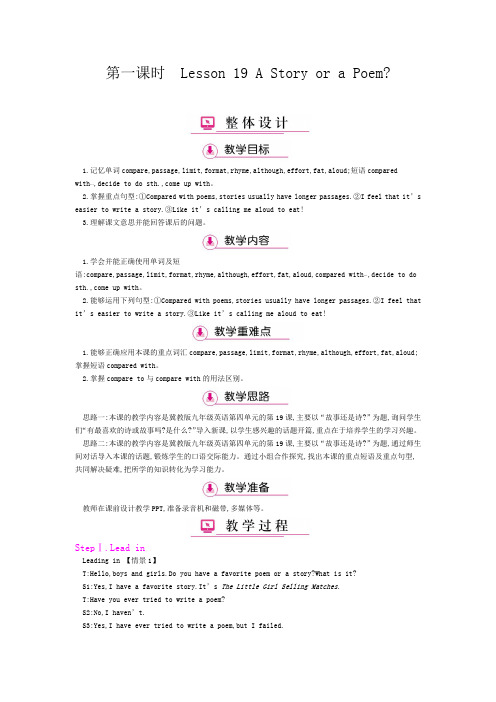
第一课时Lesson 19 A Story or a Poem?1.记忆单词compare,passage,limit,format,rhyme,although,effort,fat,aloud;短语compared with…,decide to do sth.,come up with。
2.掌握重点句型:①Compared with poems,stories usually have longer passages.②I feel that it’s easier to write a story.③Like it’s calling me aloud to eat!3.理解课文意思并能回答课后的问题。
1.学会并能正确使用单词及短语:compare,passage,limit,format,rhyme,although,effort,fat,aloud,compared with…,decide to do sth.,come up with。
2.能够运用下列句型:①Compared with poems,stories usually have longer passages.②I feel that it’s easier to write a story.③Like it’s calling me aloud to eat!1.能够正确应用本课的重点词汇compare,passage,limit,format,rhyme,although,effort,fat,aloud;掌握短语compared with。
2.掌握compare to与compare with的用法区别。
思路一:本课的教学内容是冀教版九年级英语第四单元的第19课,主要以“故事还是诗?”为题,询问学生们“有最喜欢的诗或故事吗?是什么?”导入新课,以学生感兴趣的话题开篇,重点在于培养学生的学习兴趣。
思路二:本课的教学内容是冀教版九年级英语第四单元的第19课,主要以“故事还是诗?”为题,通过师生间对话导入本课的话题,锻炼学生的口语交际能力。
九年级英语上册Unit4 Stories and poems Lesson19 A Story or
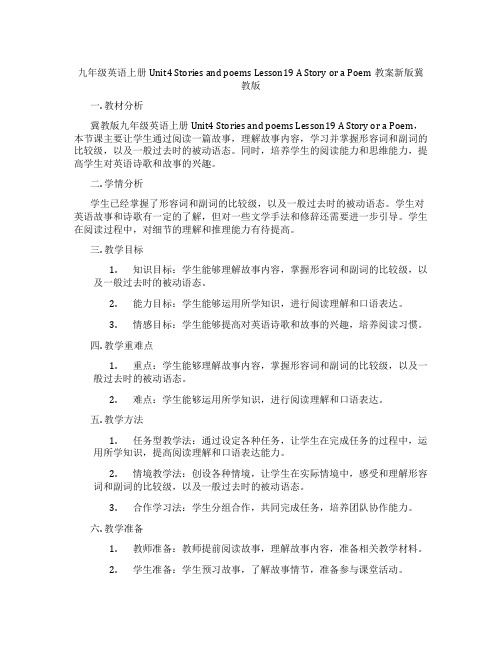
九年级英语上册Unit4 Stories and poems Lesson19 A Story or a Poem教案新版冀教版一. 教材分析冀教版九年级英语上册Unit4 Stories and poems Lesson19 A Story or a Poem,本节课主要让学生通过阅读一篇故事,理解故事内容,学习并掌握形容词和副词的比较级,以及一般过去时的被动语态。
同时,培养学生的阅读能力和思维能力,提高学生对英语诗歌和故事的兴趣。
二. 学情分析学生已经掌握了形容词和副词的比较级,以及一般过去时的被动语态。
学生对英语故事和诗歌有一定的了解,但对一些文学手法和修辞还需要进一步引导。
学生在阅读过程中,对细节的理解和推理能力有待提高。
三. 教学目标1.知识目标:学生能够理解故事内容,掌握形容词和副词的比较级,以及一般过去时的被动语态。
2.能力目标:学生能够运用所学知识,进行阅读理解和口语表达。
3.情感目标:学生能够提高对英语诗歌和故事的兴趣,培养阅读习惯。
四. 教学重难点1.重点:学生能够理解故事内容,掌握形容词和副词的比较级,以及一般过去时的被动语态。
2.难点:学生能够运用所学知识,进行阅读理解和口语表达。
五. 教学方法1.任务型教学法:通过设定各种任务,让学生在完成任务的过程中,运用所学知识,提高阅读理解和口语表达能力。
2.情境教学法:创设各种情境,让学生在实际情境中,感受和理解形容词和副词的比较级,以及一般过去时的被动语态。
3.合作学习法:学生分组合作,共同完成任务,培养团队协作能力。
六. 教学准备1.教师准备:教师提前阅读故事,理解故事内容,准备相关教学材料。
2.学生准备:学生预习故事,了解故事情节,准备参与课堂活动。
七. 教学过程1.导入(5分钟)教师通过提问方式,引导学生回顾形容词和副词的比较级,以及一般过去时的被动语态。
如:“What did you learn about adjective and adverb comparatives? What about past simple passive voice?”2.呈现(10分钟)教师展示故事标题“A Story or a Poem”,引导学生读题目,激发学生的好奇心。
冀教版九年级英语全册导学案Lesson 19
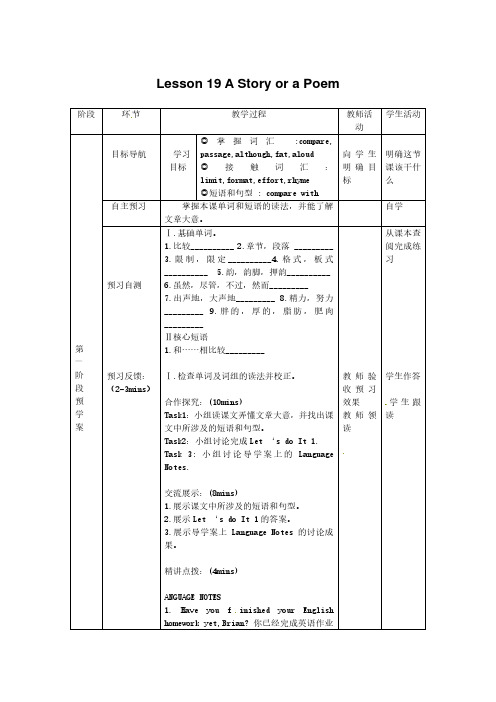
Lesson 19 A Story or a Poem阶段环节教学过程教师活动学生活动第一阶段预学案目标导航学习目标◎掌握词汇:compare,passage,although,fat,aloud◎接触词汇:limit,format,effort,rhyme◎短语和句型 : compare with向学生明确目标明确这节课该干什么自主预习掌握本课单词和短语的读法,并能了解文章大意。
自学预习自测预习反馈:(2-3mins)Ⅰ.基础单词。
1.比较__________2.章节,段落 _________3.限制,限定__________4.格式,板式__________ 5.韵,韵脚,押韵__________6.虽然,尽管,不过,然而_________7.出声地,大声地_________ 8.精力,努力_________ 9.胖的,厚的,脂肪,肥肉_________Ⅱ核心短语1.和……相比较_________Ⅰ.检查单词及词组的读法并校正。
合作探究:(10mins)Task1:小组读课文弄懂文章大意,并找出课文中所涉及的短语和句型。
Task2:小组讨论完成Let ‘s do It 1.Task 3: 小组讨论导学案上的LanguageNotes.交流展示:(8mins)1.展示课文中所涉及的短语和句型。
2.展示Let ‘s do It 1的答案。
3.展示导学案上Language Notes的讨论成果。
精讲点拨:(4mins)ANGUAGE NOTES1. Have you f inished your Englishhomework yet,Brian? 你已经完成英语作业教师验收预习效果教师领读从课本查阅完成练习学生作答学生跟读第二阶段教学案合作探究:交流展示:精讲点拨:(25mins )了吗,布莱恩 ?yet 用在疑问句中的意思是“已经”。
例如:Have you had your breakfast yet? 你已经吃过早饭了吗?When you reached the village, had thereporter left yet? 你到达那个村庄时,那位记者已经走了吗?yet 用在肯定句中的意思是“仍然,还”。
冀教版九年级英语全一册《nit 4 Stories and Poems Lesson 19 A Story or a Poem.》赛课导学案_15
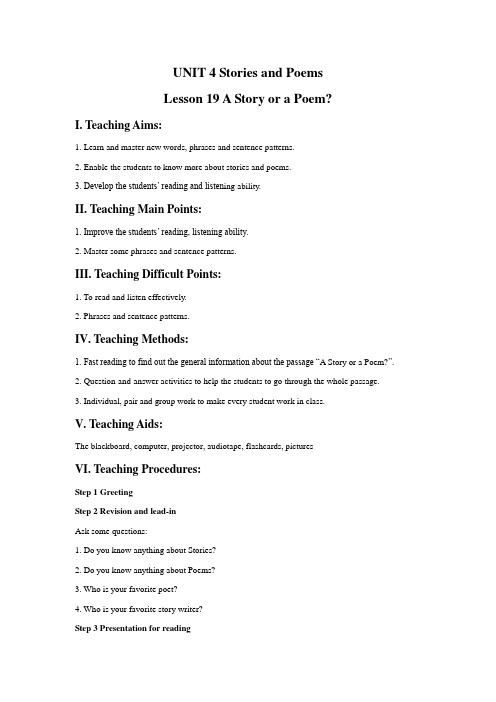
UNIT 4 Stories and PoemsLesson 19 A Story or a Poem?I. Teaching Aims:1. Learn and master new words, phrases and sentence patterns.2. Enable the students to know more about stories and poems.3. Develop the students’ reading and listen ing ability.II. Teaching Main Points:1. Improve the students’ reading, listening ability.2. Master some phrases and sentence patterns.III. Teaching Difficult Points:1. To read and listen effectively.2. Phrases and sentence patterns.IV. Teaching Methods:1. Fast reading to find out the general information about the passage “A Story or a Poem?”.2. Question-and-answer activities to help the students to go through the whole passage.3. Individual, pair and group work to make every student work in class.V. Teaching Aids:The blackboard, computer, projector, audiotape, flashcards, picturesVI. Teaching Procedures:Step 1 GreetingStep 2 Revision and lead-inAsk some questions:1. Do you know anything about Stories?2. Do you know anything about Poems?3. Who is your favorite poet?4. Who is your favorite story writer?Step 3 Presentation for readingAsk a question:Do you want to know some differences between a poem and a story?Step 4 Fast reading1. Give 2 minutes to read passage quickly.2. Answer questions on page 51.3. Repeat the right answer and write them on the blackboard.Step 5 Careful reading1. Explain some main phrases and sentence patterns.2. Give 4 minutes to read passage carefully and do the exercises in pairs.3. Check the answer: Ask a team of students do it one by one.Step 6 Practice1. Summarize the main ideas of the passage.2. Divide students to groups to discuss the passage.3. Make a competition: List the poets you like on the blackboard as much as you can. Step 7 Consolidation and summary1. Emphasize the phrases and sentence patterns.2. Retell some information about poems and stories.VII. Homework1. Write down the new words on your notebook.2. Use new words to make sentences.3. Preview Lesson 20.。
冀教版九年级英语上册 Unit4 Lesson19 《A story or a poem》学案
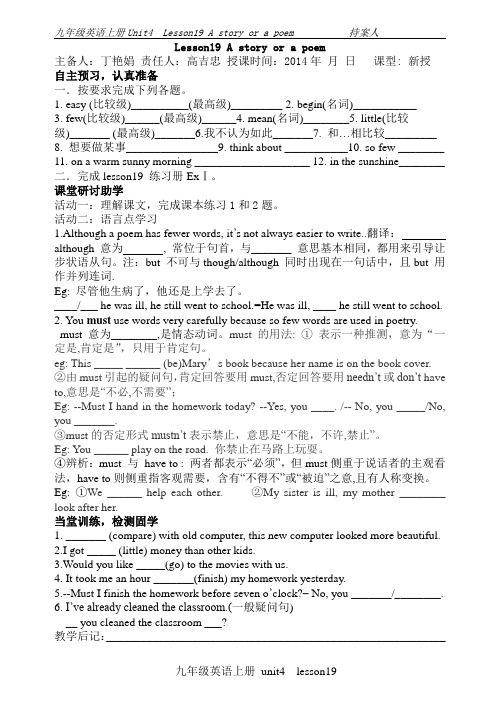
九年级英语上册Unit4 Lesson19 A story or a poem 持案人Lesson19 A story or a poem主备人:丁艳娟责任人:高吉忠授课时间:2014年月日课型: 新授自主预习,认真准备一.按要求完成下列各题。
1. easy (比较级)__________(最高级)_________2. begin(名词)___________3. few(比较级)______(最高级)______4. mean(名词)________5. little(比较级)_______ (最高级)_______6.我不认为如此_______7. 和…相比较_________ 8. 想要做某事________________9. think about ___________10. so few ________ 11. on a warm sunny morning ____________________ 12. in the sunshine________ 二.完成lesson19 练习册ExⅠ。
课堂研讨助学活动一:理解课文,完成课本练习1和2题。
活动二:语言点学习1.Although a poem has fewer words, it’s not always easier to write..翻译:although 意为, 常位于句首,与_______ 意思基本相同,都用来引导让步状语从句。
注:but 不可与though/although 同时出现在一句话中,且but 用作并列连词.Eg: 尽管他生病了,他还是上学去了。
____/___ he was ill, he still went to school.=He was ill, ____ he still went to school.2. You must use words very carefully because so few words are used in poetry. must 意为________,是情态动词。
冀教版英语九上Unit 4《Lesson 19 A Story or a Poem》教学设计

冀教版英语九上Unit 4《Lesson 19 A Story or a Poem》教学设计一. 教材分析冀教版英语九上Unit 4《Lesson 19 A Story or a Poem》是一篇关于判断故事和诗歌的文章。
文章通过讲述一个男孩和一个女孩争论一个画面的性质,引导学生在阅读过程中学会分辨故事和诗歌的特点。
本课主要词汇有:argument, gallery, artist, beautiful, ugly, wrote, famous, poem, wrote, picture, story等。
主要句型有:Is it a story or a poem? Do you like…? Yes, I do. No, I don’t. 以及表达喜好和看法的句子。
二. 学情分析九年级的学生已经具备了一定的英语基础,能够进行简单的听、说、读、写操作。
但对于本课中的某些词汇和句型,可能还需要进一步的巩固和提高。
此外,学生对于诗歌和故事的判断和分析能力有待提高。
三. 教学目标1.能够正确朗读并理解文章内容,掌握主要词汇和句型。
2.学会分辨故事和诗歌的特点,提高阅读理解能力。
3.能够运用所学知识,表达自己的喜好和看法。
四. 教学重难点1.重点:掌握文章主要词汇和句型,能够正确朗读并理解文章内容。
2.难点:学会分辨故事和诗歌的特点,提高阅读理解能力。
五. 教学方法1.任务型教学法:通过设定各种任务,让学生在实践中掌握知识。
2.情境教学法:创设情境,让学生在真实的环境中学习英语。
3.小组合作学习:鼓励学生互相讨论、交流,提高课堂参与度。
六. 教学准备1.教学课件:制作课件,包含文章内容、词汇、句型等。
2.图片素材:准备与文章内容相关的图片,用于引导学生进行判断。
3.录音设备:用于播放文章朗读音频。
七. 教学过程1.导入(5分钟)利用图片素材,展示文章中的画面,引导学生进行判断:Is it a story or a poem? 从而引出本课的主题。
冀教版九年级英语全一册《nit 4 Stories and Poems Lesson 19 A Story or a Poem.》赛课导学案_1

Lesson 19 A Story or a Poem?1.记忆单词compare,passage,limit,format,rhyme,although,effort,fat,aloud;短语compared with…,decide to do sth.,come up with。
2.掌握重点句型:①Compared with poems,stories usually have longer passages.②I feel that it’s easier to write a story.③Like it’s calling me aloud to eat!3.理解课文意思并能回答课后的问题。
1.学会并能正确使用单词及短语:compare,passage,limit,format,rhyme,although,effort,fat,aloud,compared with…,decide to do sth.,come up with。
2.能够运用下列句型:①Compared with poems,stories usually have longer passag es.②I feel that it’s easier to write a story.③Like it’s calling me aloud to eat!1.能够正确应用本课的重点词汇compare,passage,limit,format,rhyme,although,effort,fat,aloud;掌握短语compared with。
2.掌握compare to与compare with的用法区别。
思路一:本课的教学内容是冀教版九年级英语第四单元的第19课,主要以“故事还是诗?”为题,询问学生们“有最喜欢的诗或故事吗?是什么?”导入新课,以学生感兴趣的话题开篇,重点在于培养学生的学习兴趣。
思路二:本课的教学内容是冀教版九年级英语第四单元的第19课,主要以“故事还是诗?”为题,通过师生间对话导入本课的话题,锻炼学生的口语交际能力。
Lesson19Astoryorpoem导学案(无答案)-甘肃省靖远县糜滩中学冀教版英语九年级全一册
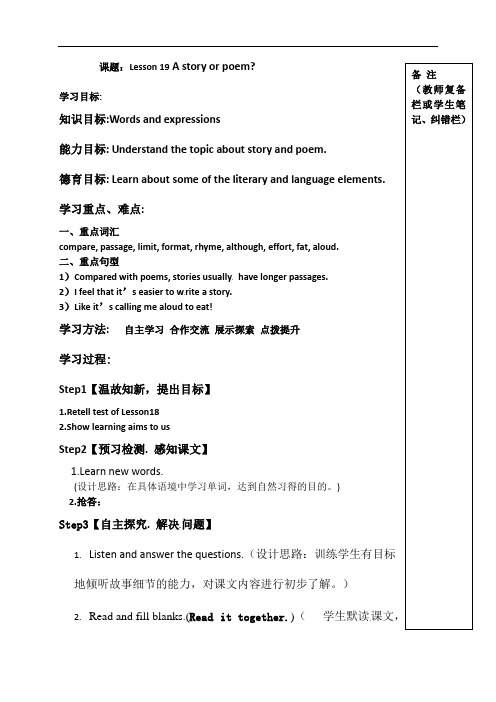
课题:Lesson 19 A story or poem?学习目标:知识目标:Words and expressions能力目标: Understand the topic about story and poem.德育目标: Learn about some of the literary and language elements.学习重点、难点:一、重点词汇compare, passage, limit, format, rhyme, although, effort, fat, aloud.二、重点句型1)Compared with poems, stories usually have longer passages.2)I feel that it’s easier to w rite a story.3)Like it’s calling me aloud to eat!学习方法:自主学习合作交流展示探索点拨提升学习过程:Step1【温故知新,提出目标】1.Retell test of Lesson182.Show learning aims to usStep2【预习检测. 感知课文】1.Learn new words.(设计思路:在具体语境中学习单词,达到自然习得的目的。
)2.抢答:Step3【自主探究. 解决问题】1.Listen and answer the questions.(设计思路:训练学生有目标地倾听故事细节的能力,对课文内容进行初步了解。
)2.Read and fill blanks.(Read it together.)(学生默读课文,备注(教师复备栏或学生笔记、纠错栏)回答问题。
) 3. Read in groups and fill in the blanks to complete the story. (设计思路:锻炼学生的朗读能力,培养小组合作精神) 4. Read and answer the questions. 祈使句的结构及用法:1. Have your finished your English hom ework yet, Brian?现在完成时的构成:“助动词have /has +动词的过去分词”yet 是现在完成时的标志词之一,常用于否定句。
冀教版九年级英语全册:Lesson19PoetryPlease学案
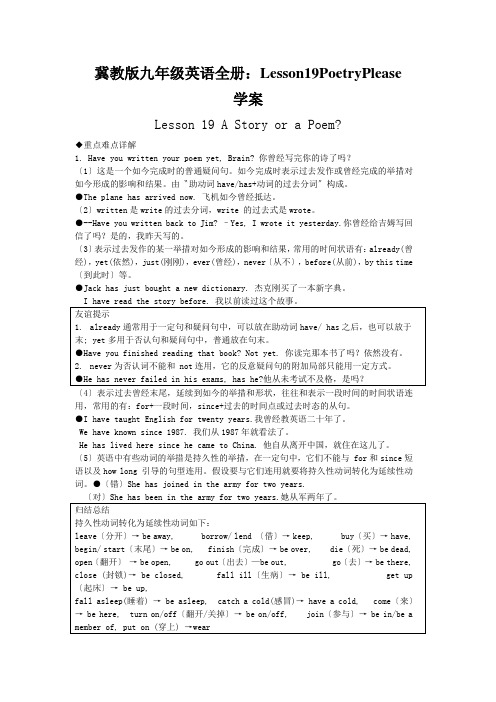
冀教版九年级英语全册:Lesson19PoetryPlease学案Lesson 19 A Story or a Poem?◆重点难点详解1. Have you written your poem yet, Brain? 你曾经写完你的诗了吗?〔1〕这是一个如今完成时的普通疑问句。
如今完成时表示过去发作或曾经完成的举措对如今形成的影响和结果。
由〝助动词have/has+动词的过去分词〞构成。
●The plane has arrived now. 飞机如今曾经抵达。
〔2〕written是write的过去分词,write 的过去式是wrote。
●--Have you written back to Jim? –Yes, I wrote it yesterday.你曾经给吉姆写回信了吗?是的,我昨天写的。
〔3〕表示过去发作的某一举措对如今形成的影响和结果,常用的时间状语有:already(曾经),yet(依然),just(刚刚),ever(曾经),never〔从不〕,before(从前),by this time 〔到此时〕等。
●Jack has just bought a new dictiona ry. 杰克刚买了一本新字典。
〔4〕表示过去曾经末尾,延续到如今的举措和形状,往往和表示一段时间的时间状语连用,常用的有:for+一段时间,since+过去的时间点或过去时态的从句。
●I have taught English for twenty years.我曾经教英语二十年了。
We have known since 1987. 我们从1987年就看法了。
He has lived here since he came to China. 他自从离开中国,就住在这儿了。
〔5〕英语中有些动词的举措是持久性的举措,在一定句中,它们不能与 for和since短语以及how long 引导的句型连用。
假设要与它们连用就要将持久性动词转化为延续性动词。
新冀教版九年级英语全册导学案Lesson19:A Story or a Poem
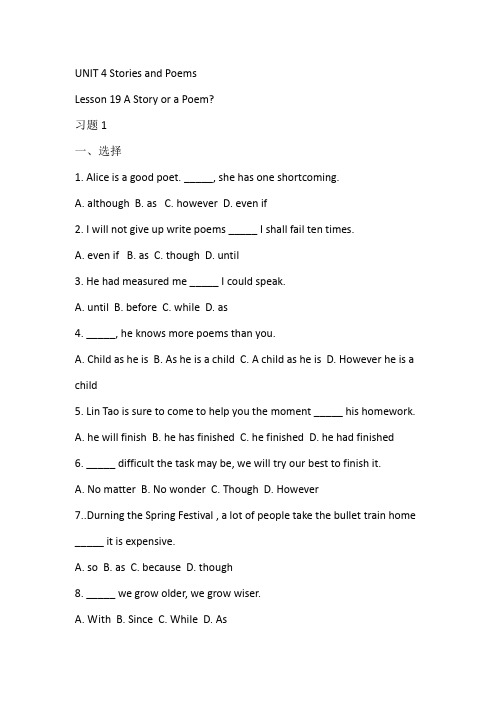
UNIT 4 Stories and PoemsLesson 19 A Story or a Poem?习题1一、选择1. Alice is a good poet. _____, she has one shortcoming.A. althoughB. asC. howeverD. even if2. I will not give up write poems _____ I shall fail ten times.A. even ifB. asC. thoughD. until3. He had measured me _____ I could speak.A. untilB. beforeC. whileD. as4. _____, he knows more poems than you.A. Child as he isB. As he is a childC. A child as he isD. However he is a child5. Lin Tao is sure to come to help you the moment _____ his homework.A. he will finishB. he has finishedC. he finishedD. he had finished6. _____ difficult the task may be, we will try our best to finish it.A. No matterB. No wonderC. ThoughD. However7..Durning the Spring Festival , a lot of people take the bullet train home _____ it is expensive.A. soB. asC. becauseD. though8. _____ we grow older, we grow wiser.A. WithB. SinceC. WhileD. As9.Mary spends a lot of money on clothes _______ her family is not rich.A. becauseB. thoughC. ifD. so10. Although he is considered a great writer, _____.A. his works is not widely readB. but his works are not widely readC. h owever his works are not widely readD. yet his works are not widely read二、完型填空There have been many great inventions that change the way we live. T he first great ___1___ was one that is still very important today—the wh eel. This made it easy for man ___2___ heavy things and to travel long di stances. For hundreds of years after that, there were ___3___ inventions that had as much effect as the wheel. Then in the early 1800’s the world started to change ___4___. There was little unknown land left in the world. People did not have to explore much anymore. In the second half of the 19th century many great inventions were made. ___5___ them were th e camera, the electric light and the radio. These have all become a big pa rt of our life today.The first part of the 20th century saw more great inventions. The helic opter in 1909. Movies ___6___ sound in 1926. The computer in 1928. An d jet planes in 1930. This was also a time when a new ___7___ was first made. Nylon came out in 1935. It changed the kind of clothes people we ar. Of course new inventions continued to be made. Man began looking ___8___ ways to go into space. Russia made the first step. Then the Unite d States took another. Since then other countries,including China and Japan, ___9___ their steps into space. In 1969 man t ook his biggest step away from earth. ___10___ first walked on the moo n. This was certainly just a beginning. New inventions will someday allow us to do things we have never yet dreamed of.1. A. scientist B. artist C. musician D. invention2. A. carry B. carrying C. to carry D. carried3. A. few B. a few C. little D. a little4. A. largely B. differently C. greatly D. freely5. A. Between B. Among C. Before D. After6. A. in B. of C. on D. with7. A. mistake B. product C. world D. material8. A. for B. out C. after D. around9. A. made B. were made C. have made D. hade made10. A. ChineseB. JapaneseC. AmericansD. Russians。
冀教版九年级英语全册Lesson19AStoryoraPoem教学设计
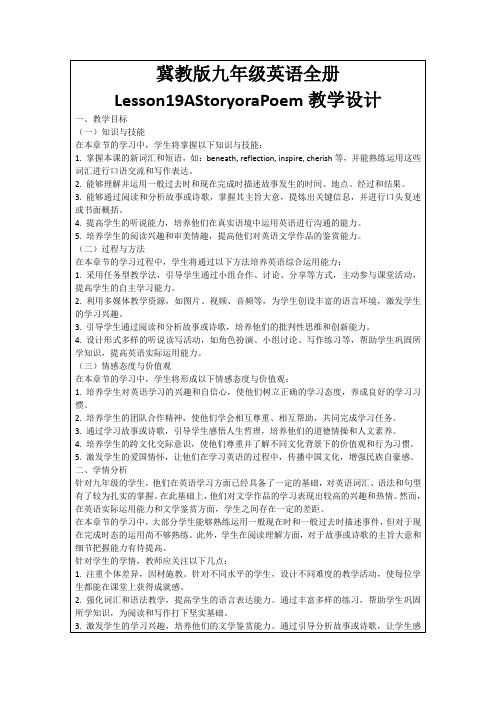
(一)教学重难点
1.重点:本课的新词汇、短语和语法(一般过去时和现在完成时)的掌握,以及故事或诗歌的理解和分析。
2.难点:现在完成时态的运用,以及对文学作品深层含义的挖掘和鉴赏。
(二)教学设想
1.利用多媒体资源,创设生动、有趣的故事情境,引导学生积极参与课堂。通过图片、视频等教学辅助手段,让学生在情境中感知、理解和运用新知识。
(3)阅读理解:引导学生阅读故事或诗歌,通过设计问题、分析讨论等方式,帮助学生理解文本,提炼关键信息,并学会分析作品的主题和结构。
(4)语法讲解:结合具体语境,讲解一般过去时和现在完成时的用法,并通过练习巩固所学知识。
(5)课堂活动:设计形式多样的听说读写活动,如角色扮演、小组讨论、写作练习等,让学生在实际运用中巩固新知识。
1.分组讨论:将学生分成若干小组,针对课文内容进行讨论。鼓励学生发表自己的观点,分享对故事或诗歌的理解和感悟。
2.角色扮演:让学生分组扮演课文中的角色,进行情景再现。通过角色扮演,提高学生的口语表达能力,增强他们对课文的理解。
3.小组展示:每组选取一名代表,向全班展示本组讨论的成果。其他组成员认真聆听,互相学习,共同提高。
随后,我会简要介绍本课的学习目标,让学生明确本节课需要掌握的知识点,包括新词汇、短语、语法以及阅读理解等。在此基础上,正式进入新课的学习。
(二)讲授新知,500字
在讲授新知环节,我将采用以下步骤:
1.新词汇、短语学习:通过展示课文中的图片,引导学生学习新词汇和短语,如:beneath, reflection, inspire, cherish等。让学生跟读、模仿,并在小组内进行交流,巩固新知识。
五、作业布置
为了巩固本节课的学习成果,提高学生的英语综合运用能力,特布置以下作业:
Lesson19AStoryoraPoem教案2023-2024学年冀教版九年级英语全册

设计实践活动或实验,让学生在实践中体验故事和诗歌的应用,提高实践能力。
在呈现新课后,对故事和诗歌的特点进行梳理和总结。
强调重点和难点,帮助学生形成完整的知识体系。
(四)巩固练习(预计用时:5分钟)
随堂练习:
随堂练习题,让学生在课堂上完成,检查学生对故事和诗歌特点的掌握情况。
鼓励学生相互讨论、互相帮助,共同解决疑问。
(三)新课呈现(预计用时:25分钟)
知识讲解:
清晰、准确地讲解故事和诗歌的特点,结合实例帮助学生理解。
突出重点,强调难点,通过对比、归纳等方法帮助学生加深记忆。
互动探究:
设计小组讨论环节,让学生围绕故事和诗歌的特点展开讨论,培养学生的合作精神和沟通能力。
鼓励学生提出自己的观点和疑问,引导学生深入思考,拓展思维。
5.故事和诗歌的写作技巧
-故事写作:掌握情节构思、人物塑造、环境描写、对话运用等技巧。
-诗歌写作:掌握意象创造、情感表达、节奏运用、韵律搭配等技巧。
6.故事和诗歌的评价标准
-故事评价:关注情节的合理性、人物的鲜明性、环境的生动性、主题的深刻性、表达的准确性。
-诗歌评价:关注意象的新颖性、情感的真挚性、节奏的和谐性、韵律的优美性、象征和隐喻的深刻性。
错题订正:
针对学生在随堂练习中出现的错误,进行及时订正和讲解。
引导学生分析错误原因,避免类似错误再次发生。
(五)拓展延伸(预计用时:3分钟)
知识拓展:
介绍与故事和诗歌相关的拓展知识,拓宽学生的知识视野。
引导学生关注学科前沿动态,培养学生的创新意识和探索精神。
情感升华:
结合故事和诗歌的内容,引导学生思考文学与生活的联系,培养学生的社会责任感。
新冀教版九年级英语全册导学案Lesson19:A Story or a Poem
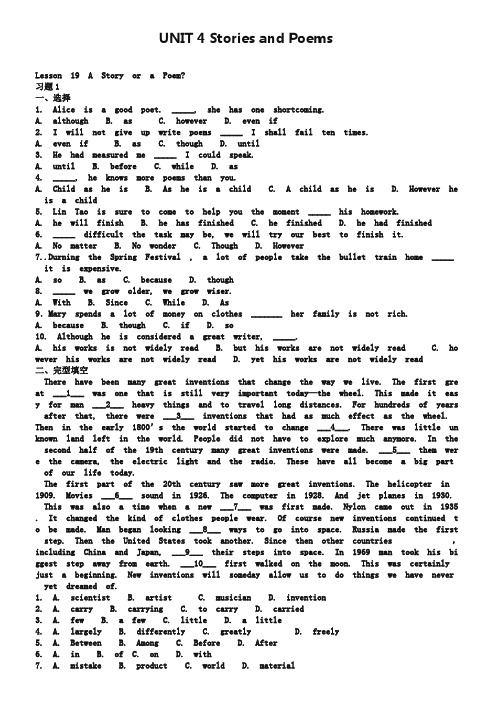
UNIT 4 Stories and PoemsLesson 19 A Story or a Poem?习题1一、选择1. Alice is a good poet. _____, she has one shortcoming.A. althoughB. asC. howeverD. even if2. I will not give up write poems _____ I shall fail ten times.A. even ifB. asC. thoughD. until3. He had measured me _____ I could speak.A. untilB. beforeC. whileD. as4. _____, he knows more poems than you.A. Child as he isB. As he is a childC. A child as he isD. However heis a child5. Lin Tao is sure to come to help you the moment _____ his homework.A. he will finishB. he has finishedC. he finishedD. he had finished6. _____ difficult the task may be, we will try our best to finish it.A. No matterB. No wonderC. ThoughD. However7..Durning the Spring Festival , a lot of people take the bullet train home _____it is expensive.A. soB. asC. becauseD. though8. _____ we grow older, we grow wiser.A. WithB. SinceC. WhileD. As9.Mary spends a lot of money on clothes _______ her family is not rich.A. becauseB. thoughC. ifD. so10. Although he is considered a great writer, _____.A. his works is not widely readB. but his works are not widely readC. ho wever his works are not widely readD. yet his works are not widely read二、完型填空There have been many great inventions that change the way we live. The first gre at ___1___ was one that is still very important today—the wheel. This made it eas y for man ___2___ heavy things and to travel long distances. For hundreds of years after that, there were ___3___ inventions that had as much effect as the wheel. Then in the early 1800’s the world started to change ___4___. There was little un known land left in the world. People did not have to explore much anymore. In the second half of the 19th century many great inventions were made. ___5___ them wer e the camera, the electric light and the radio. These have all become a big partof our life today.The first part of the 20th century saw more great inventions. The helicopter in 1909. Movies ___6___ sound in 1926. The computer in 1928. And jet planes in 1930.This was also a time when a new ___7___ was first made. Nylon came out in 1935 . It changed the kind of clothes people wear. Of course new inventions continued t o be made. Man began looking ___8___ ways to go into space. Russia made the first step. Then the United States took another. Since then other countries,including China and Japan, ___9___ their steps into space. In 1969 man took his bi ggest step away from earth. ___10___ first walked on the moon. This was certainly just a beginning. New inventions will someday allow us to do things we have never yet dreamed of.1. A. scientist B. artist C. musician D. invention2. A. carry B. carrying C. to carry D. carried3. A. few B. a few C. little D. a little4. A. largely B. differently C. greatly D. freely5. A. Between B. Among C. Before D. After6. A. in B. of C. on D. with7. A. mistake B. product C. world D. material8. A. for B. out C. after D. around9. A. made B. were made C. have made D. hade made10. A. ChineseB. JapaneseC. AmericansD. Russians。
Lesson 19 A Story or a Poem?教案
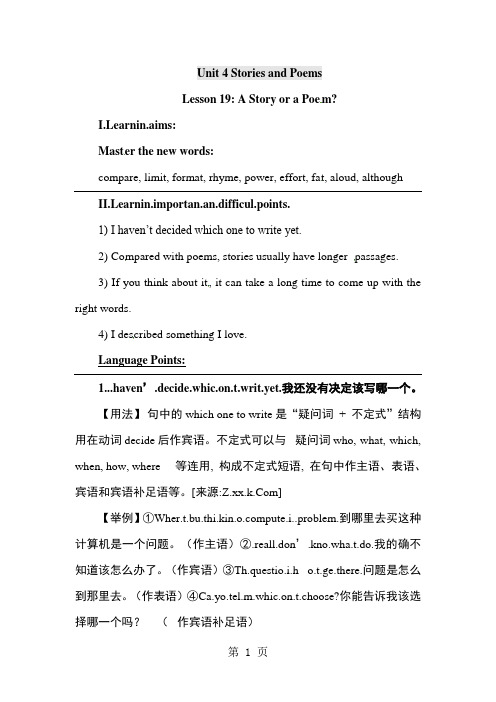
Unit 4 Stories and PoemsLesson 19: A Story or a Poe m?I.Learnin.aims:Master the new words:compare, limit, format, rhyme, power, effort, fat, aloud, althoughII.Learnin.importan.an.difficul.points.1) I haven’t decided which one to write yet.2) Compared with poems, stories usually have longer passages.3) If you think about it, it can take a long time to come up with the right words.4) I described something I love.Language Points:1...haven’.decide.whic.on.t.writ.yet.我还没有决定该写哪一个。
【用法】句中的which one to write是“疑问词+ 不定式”结构用在动词decide后作宾语。
不定式可以与疑问词 who, what, which, when, how, where 等连用, 构成不定式短语, 在句中作主语、表语、宾语和宾语补足语等。
[来源:]【举例】①pute.i..problem.到哪里去买这种计算机是一个问题。
(作主语)②.reall.don’.kno.wha.t.do.我的确不知道该怎么办了。
(作宾语)③Th.questio.i.h o.t.ge.there.问题是怎么到那里去。
(作表语)④Ca.yo.tel.m.whic.on.t.choose?你能告诉我该选择哪一个吗?(作宾语补足语)2.I.yo.thin.ab .u.wit.th.righ.words.如果你考虑一下,找到合适的单词就要花费很长时间。
【初中英语】Stories and Poems导学案(4份) 冀教版
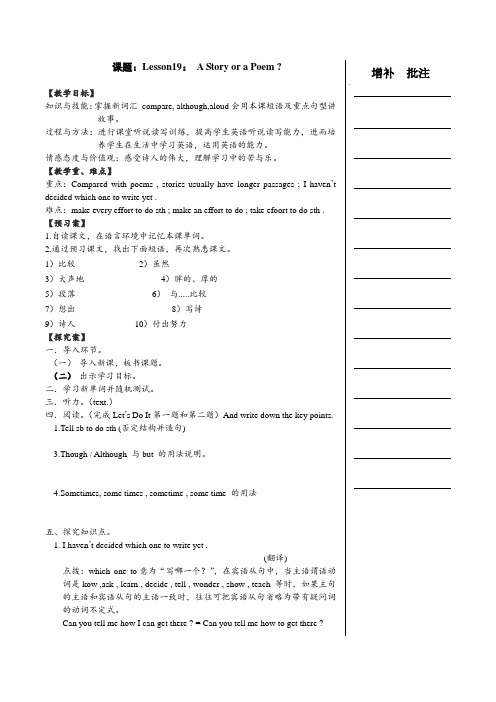
课题:Lesson19: A Story or a Poem ?增补批注【教学目标】知识与技能:掌握新词汇compare, although,aloud会用本课短语及重点句型讲故事。
过程与方法:进行课堂听说读写训练,提高学生英语听说读写能力,进而培养学生在生活中学习英语,运用英语的能力。
情感态度与价值观:感受诗人的伟大,理解学习中的苦与乐。
【教学重、难点】重点:Compared with poems , stories usually have longer passages ; I haven’tdecided which one to write yet .难点:make every effort to do sth ; make an effort to do ; take efoort to do sth .【预习案】1.自读课文,在语言环境中记忆本课单词。
2.通过预习课文,找出下面短语,再次熟悉课文。
1)比较______________ 2)虽然_____________________3)大声地_________________ 4)胖的、厚的______________________5)段落_________________ 6)与.....比较_____________________7)想出_______________ 8)写诗____________________________9)诗人_____________ 10)付出努力______________________【探究案】一.导入环节。
(一)导入新课,板书课题。
(二)出示学习目标。
二.学习新单词并随机测试。
三.听力。
(text.)四.阅读。
(完成Let’s Do It第一题和第二题)And write down the key points.1.Tell sb to do sth (否定结构并造句)______________________________________________________________3.Though / Although 与but 的用法说明。
九年级英语上册 Lesson 19 A Story or a Poem导学案(
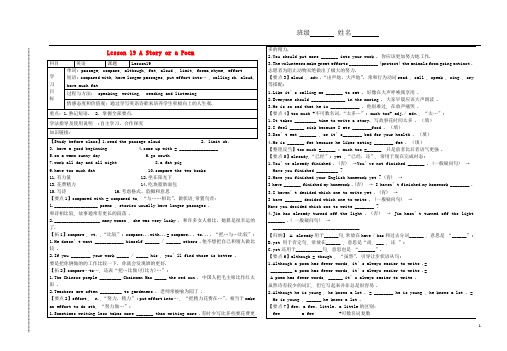
1.Like it’s calling me _______ to eat . 好像在大声呼唤我享用 .
2.Everyone should ______________ in the moring . 大家早晨应该大声朗读 .
3. have a good beginning e up with = ________________
5.on a warm sunny day 6.go south
7.work all day and all night 8.a fat pig
9.have too much fat parethe two books
Have you finished _________ ?
2.Have you finished your English homework yet ?(肯)→
I have _______ finished my homework .(否)→ I haven’t finished my homework ________ .
【要点2】effort , n.,“努力,精力”; put effort into…, “把精力花费在…”,相当于make an effort to do sth, “努力做…”:
1.Sometimes writing less takes more _______ than writing more .有时少写比多些要花费更多的精力.
和诗相比较, 故事通常有更长的段落 .
2.___________________many women, she was verylucky. 和许多女人相比,她算是很幸运的了.
- 1、下载文档前请自行甄别文档内容的完整性,平台不提供额外的编辑、内容补充、找答案等附加服务。
- 2、"仅部分预览"的文档,不可在线预览部分如存在完整性等问题,可反馈申请退款(可完整预览的文档不适用该条件!)。
- 3、如文档侵犯您的权益,请联系客服反馈,我们会尽快为您处理(人工客服工作时间:9:00-18:30)。
Lesson19 A Story or a Poem?(第一课时)
【学习目标】
单词:1compare v. 2.passage n. 3.limit v 4.format n. 5. rhyme n/v 6. although conj. 7.effort n. 8.fat adj./n. 9.aloud adv.
句型:pare with 2.so few words
自主预习,认真准备
1.自学本课单词短语。
write a poem__________________ come up with__________________
I don’t think so._______________ would love to__________________
try to do sth. __________________ compare with__________________
2.根据句意及首字母提示填写单词。
1. C with this building, that one is much higher and newer.
2. The man is so f , because he eats too much junk food and hardly does exercise.
3. Read the passage a , so that everyone in the classroom can hear you.
4. It takes us a lot of time and e to get an exhibition ready.
5. My grandfather is still active, a he is nearly 80.
3.Read the lesson and answer the questions(Exercise1,2,3 Page51)
自主探究,合作交流
Language points
6、You must use words very carefully because so few words are used in poems. 你必须谨慎使用词语,因为诗中使用如此少的词。
so 此处为副词,意为“__________________”
辨析so与such:
The sweater is ______ beautiful. ___________________________
It’s ______ beautiful a watch. _________________________________
There are ______ many people in the park. _________________________________ He is ______ a clever boy. _________________________________
It’s ______ hot weather. _________________________________ Those are ______ beautiful flowers. _________________________________
用法总结
________________________________________________________________
_____________________________________________________________________ _________________________________________________________________
7.effort 名词,意为“精力,努力”
put effort into… _________________________________
make an effort to do sth _________________________________
当堂练习,检测固学
一)、根据汉语提示完成句子。
1. 他还没有决定去哪里度假。
He hasn’t ____________ ____________ ____________ take a vacation.
2. 跟我相比,你更用功!____________ ____________ me, you work harder.
3. 在阳光下读书对眼睛有害。
It’s bad for your eye s to ________ _______the sun.
4. 我明天就读完这本书了。
I’ll the book tomorrow.
12. 有三条裙子,我还没决定选择哪条。
There are three dresses. I haven’t decided .
6. 据说男性更容易找到工作。
It is said that for men to find a job.
7. 这条狗跟着主人进了屋。
The dog entered the room, his owner.
8. 在一个雨天的上午,那位老妇人去世了。
The old woman passed away .
二)单项选择
1、Wang Xiao li was good at __ poems, wasn’t she? A. write B . wrote C. to write
D. writing
2. He can express ____________ in good clear English now after four years’ hard learning. . A. him B. his C. he D . himself
3. The baby brought a lot of happiness _____ the family.
A. to
B. with
C. for
D. in
三). 从下面方框中选择适当短语,并用其正确形式填空。
每个短语限用一次。
think about come up with wake up go for a short stay need to
1. Can I borrow your phone? I make a phone call.
2. A loud noise me this morning. Something fell down from the third floor.
3. I hope you can a better plan than this.
4. We will in Beijing during the summer holiday.
5. — Can you come to my party tomorrow evening?
—I don’t know. Give me some hours to it.。
